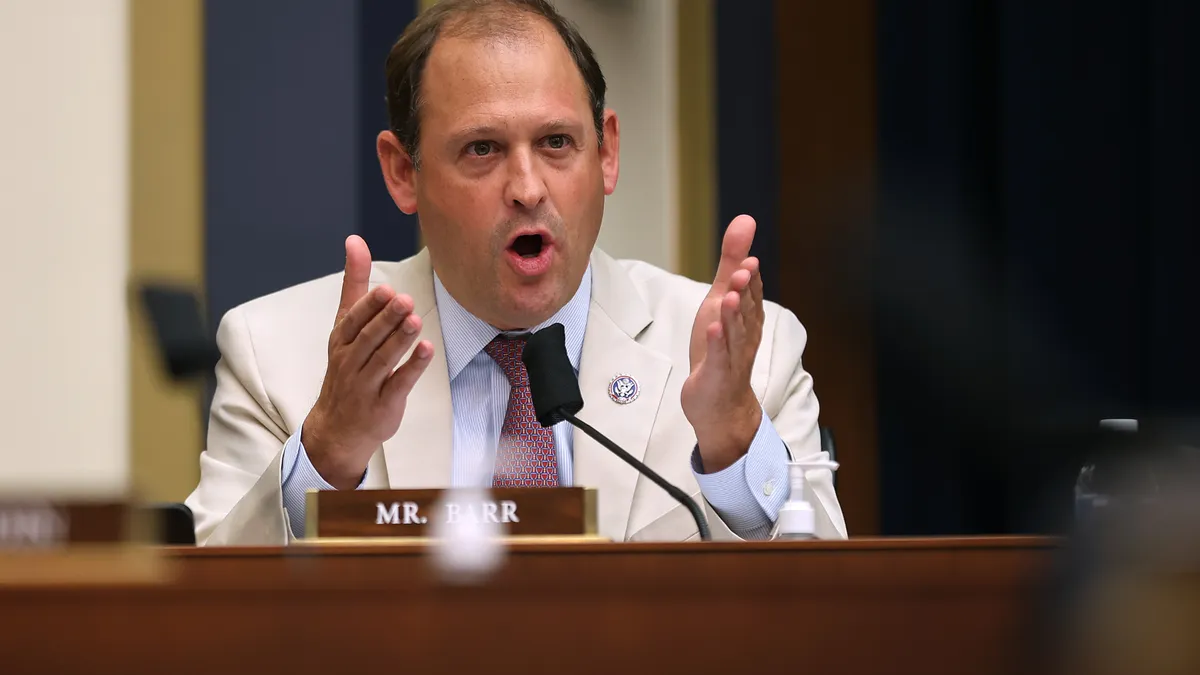Republican lawmakers railed against bank regulators’ merger review habits and pressed for more clarity around approval timing during a House Financial Services subcommittee hearing Wednesday.
To that end, a bill attached to the hearing, introduced by Rep. Andy Barr, R-KY, the chair of the Financial Institutions and Monetary Policy Subcommittee, seeks to curtail the amount of time banks wait for a regulatory response on merger applications.
Barr, likening the concept to a shot clock in basketball, complained that it takes 12 months or more for transactions to be approved.
“The regulatory purgatory, the indecision, is what we’re concerned about here,” Barr told witnesses, who included James L. Anderson, deputy general counsel at the Federal Deposit Insurance Corp., and Ted Dowd, acting senior deputy comptroller and chief counsel at the Office of the Comptroller of the Currency, during Wednesday’s hearing.
This year, both agencies have put forth updated guidance on bank merger reviews. The OCC’s changes include removing the expedited bank merger procedures and enhancing clarity and transparency with regard to bank mergers. The FDIC, under its proposal, would more closely scrutinize mergers that create banks with more than $100 billion in assets, while weighing the impact to local communities for smaller mergers. Both agencies are accepting comments on their proposals.
Dowd noted during the hearing that OCC staff have worked with Barr’s staff on the legislation and they’ve had productive conversations.
The shot clock concept in Barr’s bill is welcome, said James Stevens, a partner at Troutman Pepper’s financial services practice.
“The proposed shot clock is needed given the current delays that we frequently see and the potentially increased delays that many expect in the future as bank merger policies change,” Stevens said in a Thursday email. “The proposal still gives the regulators the flexibility they need to extend the clock if warranted but is positive because it generally injects the expectation of prompt action into the process, which should help with most applications.”
The bill seems to only apply to the Federal Reserve, which did not have a witness at the hearing, noted Michele Alt, a partner at financial services advisory and investment firm Klaros Group.
Cleverly, Alt said, the bill addresses the issue of the clock not starting until regulatory agencies deem an application complete, by specifying that action on an application has to occur within 90 days of submission, “regardless of whether the record on such initial application was complete,” according to the bill.
In that regard, the bill could be effective as “a forcing mechanism,” to provide clarity to banks, Alt said. “It’s absolutely the case that mergers are languishing,” she said.
Still, she said she’s doubtful about the legislation’s chances of passage.
During Wednesday’s hearing, Rep. Bill Foster, D-IL, said the community bankers he recently spoke with in his state expressed no issue with the time it’s taken for merger applications.
"To the extent that we might consider a shot clock, a legislative time limit on regulatory approvals, it seems like the time should be appropriately scaled to the size and complexity of the contemplated merger,” Foster said.
The OCC’s notice of proposed rulemaking includes a number of features consistent with timely approvals, such as satisfactory supervisory ratings, no open enforcement actions, and no fair lending concerns, Dowd said.
Rep. Blaine Luetkemeyer, R-MO, contrasted the quick actions by regulatory agencies in cases such as Silicon Valley Bank or Signature Bank, with other mergers, which can take far longer.
“It takes months to get this done. There’s no reason for that,” he said. “I think our chairman has got it right – we need a shot clock on you guys. To make sure that you do this job and do it correctly. And keep the uncertainty from happening to the two banks involved.”
For some small banks, complying with regulations has become cost-prohibitive, and when they try to merge in response to that strain, “it’s very difficult for them to do that,” Luetkemeyer added.
Last year, the FDIC’s average time to review a merger application was 109 days, once an application was received, Anderson said, or 68 days, once an application was deemed substantially complete.
"Our goal is to hit 60 … days, on a typical case. We meet that goal approximately 60% of the time,” Anderson said. “We’re certainly aware that, at times, applications have not moved as quickly as we would like."
The FDIC’s proposed statement of policy seeks to make clear how the agency will evaluate factors and what’s needed for the agency to move quickly in the review process, he added.
When Rep. Ayanna Pressley, D-MA, mentioned the potential negative effects of mergers on their communities, such as bank branch closures, Anderson noted the FDIC seeks to ensure services are carried through for customers, so the agency reviews the business plan of the resulting bank over three years, as well as branch opening and closing plans.
As for the OCC, mergers of smaller institutions tend to be processed quickly and efficiently, Dowd said.
"With respect to the larger institutions, those transactions are more complex, and complexity drives timing,” he said.
A “clean” transaction involving large banks can move quickly, and although the OCC is aware of the benefits of a streamlined process, “a lot of it is dependent on what comes in on the application,” Dowd said.
If a merger application introduces safety and soundness or risk concerns, the OCC needs to ensure it’s on top of those, Dowd added.






















